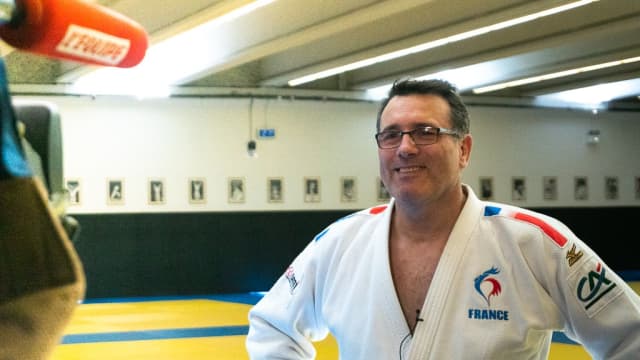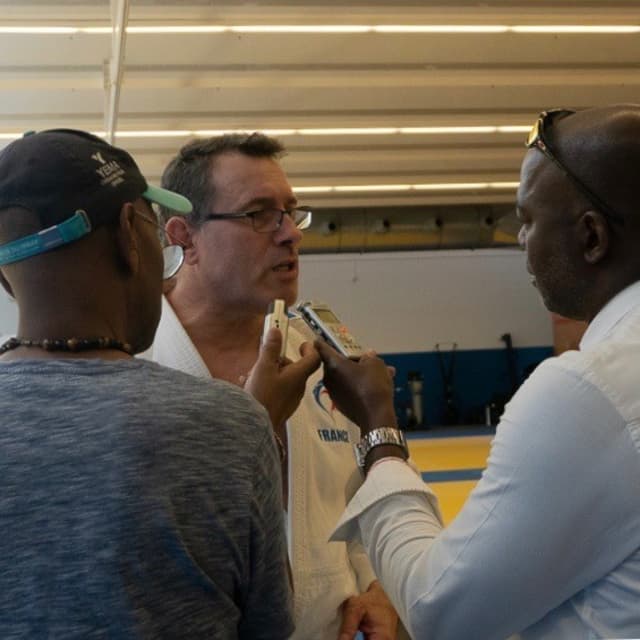Were there any specific instructions for athletes concerning dietetics? What has been the impact?
From the start we set up a monitoring of our athletes on all fronts; the dietary aspect was of course important. Our dietitian Laurie Anne Marquet carried out an individual follow-up for all of our Olympic athletes, setting up specific sheets as needed, including weight loss and weight gain, according to needs and possible training style for each of them. From this and to add an element of cohesion and animation, she set up cooking lessons by video.
What role did the psychological aspect play in maintaining the concentration of the athletes during this difficult period?
None of our athletes have had particular psychological problems. The only slightly critical moment for some was the announcement of the postponement of the Olympic Games. This was very much on the sidelines, but we ensured a psychiatric follow-up for 2 or 3 athletes.
How did you tell them to continue training and not give up hope?
I told them that they were finally lucky to have time in front of them to work on the long term, depth and above all in a different way. That it was time to build a physique and a titan resistance and for the youngest that they were going to be able to lay the foundations for their 2024 and 2028 project.
What about you as head of the French teams? What did you say to yourself?
My only concern was with the athletes, I have been and I am still at work!
How was the training organised during the confinement?
Since the start of confinement, I have emphasised with the coaching staff to know where our athletes were, what was their place of confinement and what materials and possibilities they had to be able to train. Of course the situations of each and everyone could be different, with apartment, house, garden etc and also whether they were alone, with family or friends. Just before confinement, we had just enough time to collect training equipment from INSEP, such as rowers, skiers, bodybuilding equipment and more and dispatch it to the athletes. Based on this, each coach has been responsible for supporting the athletes under his or her remit, providing them with training programmes and everything that may be useful for performance. Of course, the mental dimension is obviously taken into account for those who need it. Contacts by video call are therefore very regular and necessary. Finally, we have made available, working modules that require mental visualisation in order to lose as little as possible contact with the dimension of combat and judo training.
To do this, our physical trainers, our dietician, our video manager, our physiotherapists, our doctors are fully mobilised.
So, there are, Individualised PPG programmes, diet sheets, specific video material responding to the athlete and / or coach's command, care and rehabilitation protocols, telephone contact with doctors and appointment possibilities at INSEP in case of emergency, visualisation working modules. It’s full! All the staff meet regularly by videoconference in order to coordinate their actions with the athletes, to discuss the evolution of the situation, in particular with regard to the calendar. The postponement of the Olympic Games obviously changes the situation and we are waiting for IJF decisions and of course we try to anticipate as much as possible the rest of the season, with regard to internships, competitions, return to school and to INSEP. Regular points are also organised with the medical staff to ensure that everyone's health is good, given the health situation and then to take stock of the state of injuries, wellbeing, rehabilitation and adaptation of training programmes.
How did you stay in touch?
Contact has been kept permanently via telephone, WhatsApp groups, videos, collective training by video and more.
On a personal level, how do you manage time now? What are the differences compared to before the crisis? Between telework and possible presence in the field?
Personally, I continue to lead video meetings with colleagues who have not yet been able to return to the field. For the rest, I am already back with the Olympic staff and the athletes of the Olympic group at INSEP. I must admit that this way of working by video is very interesting and effective, it is a way to save a lot of time and to be very innovative and specific in our interventions.
What is your personal feeling in relation to the world situation and how do you see the future of judo?
I believe that we are a bit nearer the end of this pandemic but that we must remain vigilant for the coming year. We are not immune to a second wave that could come back to communities.
Are you thinking of specifically modifying the judo technique with the French teams and the way to approach it?
On the technical judo level, there is nothing to change fundamentally, but on the other hand we must always be creative and keep an eye on on other routes and possibilities.
What kinds of equipment do you like your athletes to use when training alone or in isolation?
I especially hope that it is the athletes who choose their equipment and the tools that they find most effective. There can be mannequins, sleeves, elastics, I find all these tools and many more effective.
What positive lessons do you draw from this period? What will impact you specifically in your life and at work?
For the athletes: The most important and positive thing that I will remember from this difficult period is that it allowed our athletes to gain autonomy. Some were already very comfortable, but for others this test was a real test.
For the staff and myself: it's a bit of the same thing; we have gained flexibility and working efficiency and our modes and means of communication have improved even further.
Were there any judokas that particularly impressed you and why?
I must say that all the French judoka impressed me with their ability to adapt and stay the course. I am very admiring of those who have taken advantage of it to set new challenges and objectives. I am very happy to see that some have taken the opportunity to lay the foundations of the future Olympic cycles.
If you find Aladdin’s lamp and can make three wishes, what would you like?
Obviously, this is a very difficult question, but one that is also straightforward: Peace, health for all and for the Mixed French Judo Team to be Olympic champions in Tokyo in 2021.


